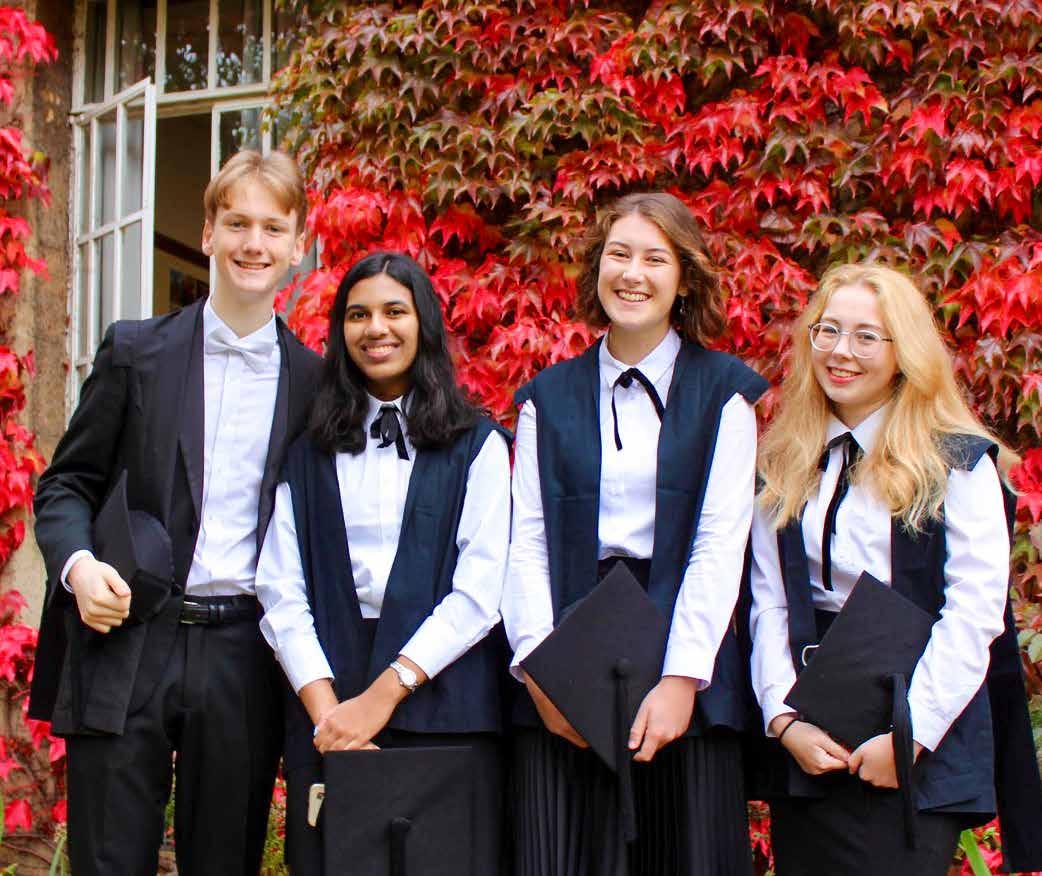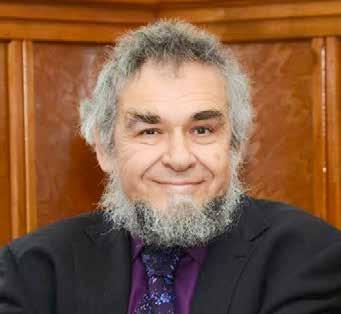
7 minute read
Principal’s Foreword Message from Dr Robert Ellis
Principal’s Foreword
Dr Robert Ellis
Advertisement
What a year we have lived through. It sometimes seems as if we have spent much of the last year responding to, or anticipating, the latest developments of the pandemic as they impinge upon College and University life. That impact on College, as on every other part of shared life, has been immense. Education went online last Trinity Term, was a hybrid of the virtual and face-to-face in Michaelmas, and now is back online again for Hilary 2021. We still hope for better things for Trinity 2021, but we have all become used to constantly resetting our expectations.
The University and the College have each done a remarkable job in rising to the challenges of the pandemic and keeping educational standards at the very high level we expect here. Our students and our staff have shown amazing resilience and resourcefulness. We had an extremely strong set of examination results last summer as one sign of this (among undergraduates, more Firsts than ever before – fifteen - despite the peculiar stresses of re-arranged and online examinations) and our staff have continued to garner awards and honours. Students rated the learning experience at Regent’s top in the University in the 2020 ‘Student Barometer’ exercise (and a very creditable fifth for living experience). Among the casualties of the pandemic we must lament the 50th anniversary of the Boat Club’s first outing in Summer Eights back in 1970.
The last year or so is proving a time of transition in College, not least in the arrival of a number of new members of staff who have joined Regent’s, some in senior positions. In Dr Anthony Reddie and Dr Christine Joynes we welcomed new Directors for our refreshed research centres; Sarah Mann became College Librarian; and Jennie Taylor began as Academic Administrator in January 2020. Dr Kate Kirkpatrick began as Fellow in Philosophy & Christian Ethics on the cusp of lockeddown Trinity. Mike Freeman took over as Director of Operations in time to plan for the strange Michaelmas, and Esther Mason started as Chaplain and Head of Welfare on an interim appointment. In addition, we have welcomed new colleagues to the History tutorial team, the Reception team, the Development Office and Outreach & Access.
Settling in to a new job can be difficult at the best of times, but it has been particularly challenging in this period when normal contact and conversation has been constrained, and it would not be a surprise if it was more difficult to feel the sense of belonging which has always been important to us here. Our first-year students who arrived on site in Michaelmas 2020, living in ‘household bubbles’ and without many of the usual social and cultural opportunities that Oxford offers, nevertheless generally reported a very positive experience – and we hope that their course becomes more ‘normal’ as the next few terms unwind.
Of course, we have also said goodbye to some staff members during the past year. I am not going to list them all here for fear of missing someone out but I will briefly salute our retiring Chaplain and Head of Welfare, Dr Myra Blyth, whose work has done so much to nurture community and well-being in College – and also Dr Matthew Mills, who wore several hats during his time in College and was very closely involved in the publication of this magazine.
Personally, this strangest of years has been made more bittersweet because it will be my final year in post as Principal: I told Governing Body last summer that I would stand down as Principal at the end of this current academic year in September. In a role like this finding a ‘good time’ to step aside is always very difficult and any moment of departure will inevitably leave some loose ends. For instance, it will be a disappointment not to see through the first part of our vision for enhancing the College’s buildings. However, while the current Covid situation has created uncertainty that continues to play out through 2020/21, it will also be appropriate that a new Principal should lead the College in the years beyond it.
The College has grown significantly during my tenure, most noticeably in the size and academic diversity of its graduate community. I am proud of many of the things we have achieved together in these fourteen years, and since 2007 we have also made positive changes so that the management and processes of the College fit better the kind of larger and more complex institution we have become. There are big questions ahead for Regent’s: our place in the University structure needs constant examination; the financial and other challenges which impact a small unit when infrastructure and compliance demands grow; the need for improved and increased accommodation for students and staff; a fuller integration of the larger postgraduate body; and our position as a provider of ministerial training in a changing world.
I think the College is well set to face whatever the future holds – not least because of the vital work that has been done in the last few years on improving our financial situation. We stand ready for opportunities as well as challenges, and I look forward to us all giving my successor our full-throated support.
Highlights from 2020
2020 was a year unlike any in the history of the College. And yet, while much about 2020 will be memorable for the wrong reasons, the Regent’s Community has also had much to celebrate!
Principal Emeritus and Senior Research Fellow Professor Paul Fiddes was elected a Fellow of the British Academy. Professor Fiddes was recognised for his work in the field of modern theology; doctrine in the context of ideas of wisdom and suffering; and the relation of theology to the philosophy and creative arts of late-modern culture, particularly in interface with literature.

Director of the Oxford Centre for Religion and Culture, Dr Anthony Reddie, was honoured in the Archbishop of Canterbury’s Lambeth Awards, which recognise outstanding contributions to the church and wider society. Dr Reddie received the Lanfranc Award for Education and Scholarship for his exceptional and sustained contribution to Black Theology and beyond.
Caitriona Dowden (Philosophy and Theology, 2017) was awarded the Gibbs prize for best performance in the Final Honour School in Philosophy and Theology for 2019-2020 by the Faculty of Theology and Religion.
In July 2020 the Oxford Prospects & Global Development Institute published Modernisation of Education and Social Governance, a collection of papers that address ageing population demography, alleviation of poverty and inequality, educational progress, revitalisation of rural localities, strengthening of industry, and human welfare.
In June 2020 the College said goodbye to Dr Myra Blyth as Fellow and Chaplain after sixteen years working at the College. To mark the occasion, a book of essays exploring different aspects of liturgy, ecumenism and restorative justice, Reconciling Rites, was published in her honour.

Our 2020 finalists achieved phenomenal results! Despite the immense challenges presented by Trinity term, 15 students out of a cohort of 37 were awarded Firsts. Particular recognition goes to Charlotte Haley (Classics and English, 2016) who was awarded a Congratulatory First.
Dr Lorraine Wild, Director of Studies in Geography, received the 2020 Social Sciences Divisional Teaching Excellence Award for Outstanding Achievement in July.

May 2020 marked 50 years since Regent’s first boat club competed in the annual Summer Eights Bumps Races.

The results of the Annual Student Barometer Survey for 2019, released in June 2020, ranked Regent’s as the best college within the University for learning experience and fifth for living experience satisfaction.
The College contributed again this year to Oxford’s annual Meeting Minds Global event with Dr Alison Rosenblitt, Director of Studies in Classics, reading from her book The Beauty of Living: E.E. Cummings in the Great War (2020: W.W.Norton), named an Editor’s Choice in The New York Times (13 August 2020).
In Autumn 2020, College Research Fellow in Religion and Society and Associate Director of the Oxford Centre for Religion and Culture, Dr Paul Weller, was appointed a Trustee of the Inter Faith Network for the United Kingdom (interfaith.org.uk). The Network is a key national body that seeks to facilitate and link national faith community representative bodies; national and regional inter faith organisations; local inter faith groups; and academic and educational bodies.
Emmanuelle's birthday in 2020 was a quieter affair than normal in accordance with social distancing rules. But the College still came together via Zoom to watch the grande dame enjoy her veggie birthday cake.











